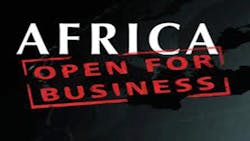Africa No Longer Risky Place to Do Business
DAVOS, Switzerland -- With growth rates to rival Asia and vast untapped potential, Africa has moved beyond its reputation as a risky place to do business, leaders from the continent said on Wednesday.
Gathered at the World Economic Forum in the Swiss ski resort of Davos, African leaders said that while many difficulties remain -- including shabby infrastructure and widespread youth unemployment -- investing in the continent is no longer the dangerous bet it once was.
"Is Africa more risky than any other region in the world?... This is a perception that needs to be dealt with," South African President Jacob Zuma told a panel on "De-risking Africa" at the annual gathering of the global business elite.
"There is evidence that Africa is growing, there is also evidence that African leaders have collectively moved together to do things that will help Africa move forward," he said.
Nigerian President Goodluck Jonathan agreed that Africa should no longer be singled out.
"In any investment, any venture, there is always a risk in business, not just Africa," Jonathan said on the panel.
"Before this time, African states were quite politically unstable... Now most countries are reasonably stable, so businessmen can make predictions."
Bucking global trends, sub-Saharan Africa had enjoyed an unbridled economic boost and is forecast to enjoy the type of high growth rates not seen outside Asia in recent years.
The International Monetary Fund in October predicted the region's economy would grow by 5% in 2012 and by 5.7% in 2013, with especially strong growth in Ghana, Ivory Coast, Nigeria, Angola and Gabon.
"The last bastion of big growth is the African continent," Indian telecom mogul Sunil Bharti Mittal, whose Bharti Enterprises has extensive operations in Africa, told the panel.
"The narrative in Africa is changing, and changing very fast," he said.
Improvement Still Needed
Still, everyone admitted that sub-Saharan Africa, which accounts for just 2.5% of global gross domestic product (GDP), has a long way to go.
The continent's infrastructure lags far behind many other parts of the world, with business leaders at the panel complaining of the lack of good roads, in particular between countries, and unstable electricity and water supplies.
"Of course the issue of the infrastructure gap is significant," Jonathan acknowledged.
Zuma said that African leaders were working together to improve infrastructure and coordinate efforts, pointing as an example to the $80 billion Grand Inga Dam project in the Democratic Republic of Congo.
"Collectively the African Union has taken concrete decisions with regards to infrastructure," he noted.
Groups like the African Union and West African regional bloc ECOWAS have also taken on key roles in resolving unrest on the continent, the leaders said, including in the ongoing conflict in Mali.
"Definitely if you look at the situation in Mali, if it is not contained it will leak into West African countries," said Jonathan, whose country is sending 1,200 troops to take part in an African force helping French and Malian soldiers fight Islamist rebels in Mali's north.
Rwanda's President Paul Kagame, whose country is enjoying one of the fastest growth rates in Africa, said the continent's leadership also needed to take ownership of its problems.
"Investment risk is present in Africa, as it is in the rest of the world. You find different risk levels relating to different places, but they will be anywhere," he told the panel.
"For me, the best thing we can do for ourselves is own our problems and own our solutions."
For more on Africa's potential for major investments by U.S. manufacturers, click here.
Michael Mainville, AFP
Copyright Agence France-Presse, 2013
About the Author
Agence France-Presse
Copyright Agence France-Presse, 2002-2025. AFP text, photos, graphics and logos shall not be reproduced, published, broadcast, rewritten for broadcast or publication or redistributed directly or indirectly in any medium. AFP shall not be held liable for any delays, inaccuracies, errors or omissions in any AFP content, or for any actions taken in consequence.
